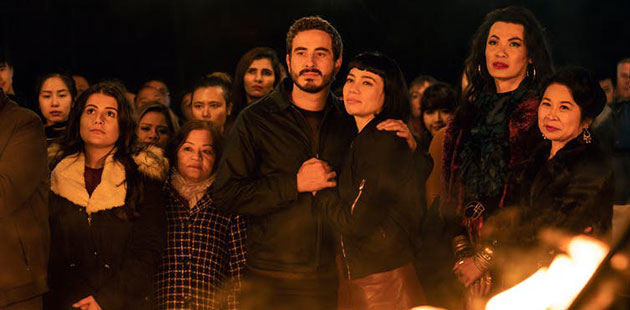 We all have our own ghosts, my grandmother would say. But sometimes the pain of past trauma can seep from one generation to the next, haunting an entire family. – May Le
We all have our own ghosts, my grandmother would say. But sometimes the pain of past trauma can seep from one generation to the next, haunting an entire family. – May Le
On the 15th night of the seventh month in the lunar calendar is the traditional Buddhist and Taoist Hungry Ghost Festival, when the gates to hell open and spirits wander the earth.
Families honour and appease their ancestors through remembrance, prayer and offerings. But it is also a time of caution lest aggrieved ghosts seek retribution.
In the new supernatural drama Hungry Ghosts, directed by Shawn Seet for SBS, a tomb is discovered during a mine-clearing operation in Vietnam. From this tomb, an evil spirit named Quang (Vico Thai) is released, bringing the dead back with him.
The return of these spirits forces four families in contemporary Melbourne to confront ghosts of the past buried deep in their secrets, sins and personal struggles.
Protagonist May Le (Catherine Van-Davies) is tasked with preventing Quang from keeping the gates to hell open for eternity; her journey is one of self-discovery and embracing her heritage after the death of her grandmother Phuong (Linda Hsai).
The Nguyen, Tran and Stockton families each bear the heavy burdens of the Vietnam War. Survivor guilt, painful memories and regrettable past actions threaten to tear their families apart.
Inherited traumas
Unresolved trauma impacts the present through intergenerational hauntings, both literal and metaphorical.
The spirit of a drowned man whom Diane Tran (Oakley Kwon) once wronged possesses her daughter Sophie (Jillian Nguyen). The ordeal of war leads to the fracturing of relationships between Anh Nguyen (Ferdinand Hoang) and his son Paul (Gareth Yuen) and wife Lien (Gabrielle Chan).
While the first episode is heavy with exposition in the great unveiling of the dead and the explanation of Quang’s mission, the series maintains a tension that makes for gripping viewing.
The musical score (composition by Roger Mason) thrums throughout the series and gets under your skin. Just as the eerie soundtrack is occasionally interrupted with romantic serenades of a bygone era, the narrative tension gives way to moments of humour and tenderness.
When grandmother Lien is visited by the ghost of her first husband Khoa (Hoa Xuande), she is transported back to her earlier life and an uncomplicated love. The visual interplay between Lien in old age and in youth is a poignant reminder of human mortality, and the longing and loss that comes with the passing of time.
These interludes of contemplation and nostalgia are reminiscent of the aching melancholy of the films of Wong Kar Wai, offering brief reprieves before the serious business of stopping a psychopathic spirit starts again.
For some viewers, Hungry Ghosts will have some uncanny resemblances to plot devices used in the Harry Potter saga and a certain landmark film of the supernatural thriller genre (you’ll know when you see it).
Despite these inevitable comparisons, the series avoids the trappings of an Australian miniseries trying to be Hollywood. Hungry Ghosts retains a distinctive Australian-ness.
It proudly locates itself in Melbourne, and puts front and centre in the story the Vietnam War and the ensuing humanitarian crisis (“the boat people”) that has been so central to contemporary Australian history and national identity.
Read more: On asylum seekers, our history keeps repeating itself
In the four-part series, a romance is rushed and predictable, and it is disappointing that among such a rich Asian-Australian cast several of the Anglo-Australian cast members are headlined to promote the series (the Stockton family cast are also the first to appear in the end credits). But these criticisms aside, Hungry Ghosts is an achievement on many levels, and a valuable contribution to Australian storytelling.
An Australian story
The series casts over 30 Asian-Australian actors in leading and ensemble roles, including transgender woman Suzy Wrong (who plays the wonderfully eccentric clairvoyant Roxy Ling), alongside 325 Asian-Australian extras. Joining director Seet is executive producer Debbie Lee, and writers Michele Lee and brothers Jeremy and Alan Nguyen.
Read more: Whitewash on the box: how a lack of diversity on Australian television damages us all
The investment in bringing together this accomplished cast and crew signals an exciting future for national television. While Hungry Ghosts focuses on the Vietnamese-Australian community, the intertwining stories across generations and cultural groups will have broad resonances.
As an Asian-Australian, it was affirming to see faces like mine on screen, as well as representations of familiar beliefs, rituals and practices. These depictions were not tokenistic, marginalised or exotic window-dressing. The Vietnam War and Hungry Ghost Festival are the story’s bedrock. A cultural richness permeates throughout the series.
Smoking joss sticks, shrines adorned with photos of departed family members, the bright chime of a wooden mallet struck against a prayer bowl, the mix of languages spoken within the same conversation by family members of different generations – in interweaving these details, Hungry Ghosts is a textured depiction of the lives and spiritual connections of a diasporic community that now calls Australia home.
Hungry Ghosts premiered on Monday 24 August and continues to Thursday 27 August on SBS and SBS On Demand![]()
Hungry Ghosts review: a culturally rich supernatural drama
Christina Lee, Senior Lecturer in Literary and Cultural Studies, Curtin University
This article is republished from The Conversation under a Creative Commons license. Read the original article.
Image: Hungry Ghosts – courtesy of SBS
